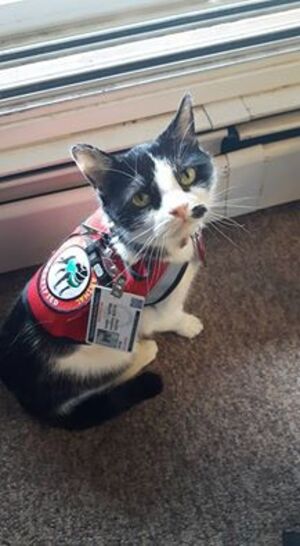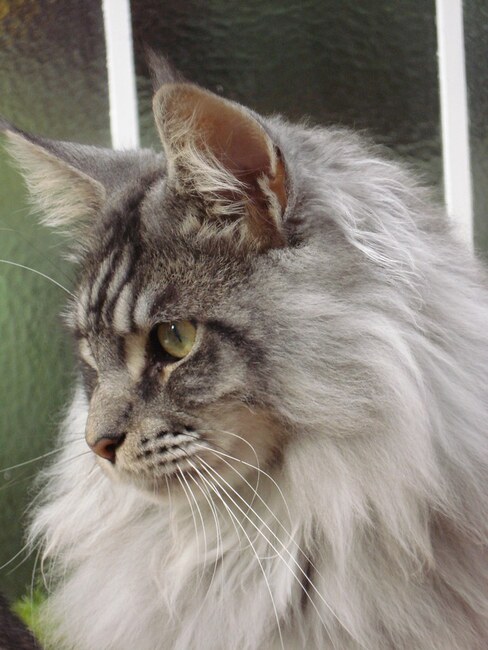- What Are Emotional Support Animals (ESAs)?
- Benefits From Having an ESA
- What Animals Can Be Emotional Support Animals?
- Why You Should Consider Making Your Cat an ESA
- Do You Need to Register Your Cat as an ESA?
- How to Make Your Cat an ESA?
- Can You Live In a Rental Apartment With Your Cat as an ESA
- Emotional Support Cats and Therapy Cats- Do Both Terms Mean the Same?
- Emotional Support Cats and Service Animals
- Can You Fly With Your Cat as an ESA
- Cat Breeds Considered Calm and Friendly

There are different types of assistance animals- Service Animals, Therapy Animals, and Emotional Support Animals. Whether they perform specific tasks, directly related to a certain disability, or provide comfort and companionship, we can say for sure that their presence immensely benefits the lives of many people worldwide. When talking about “assistance animals”, most of you are likely to think about dogs. It is quite normal to think about dogs, as we know how intelligent, loyal and loving they are, we have seen dogs guiding visually impaired people, pulling a wheelchair, or performing various tasks for them. In general, the term “assistance animal” is typically related to dogs in most people’s minds.
We would like to pay attention to another species, that many of you are likely to raise at home and enjoy its company- cats. These little cute fellows are preferred by a lot of people due to their gorgeous look, cuddling, and friendly personality, as well as due to their independence and strong will. Whether these gorgeous creatures can be Emotional Support Animals or not, is a question that we will answer today.
What Are Emotional Support Animals (ESAs)?
Emotional Support Animals are defined as animals, that help their owner deal with challenges due to an emotional, mental as well as a physical illness. ESAs provide comfort and companionship to their owners and mitigate the symptoms of their health condition. People who suffer from anxiety, depression, stress, PTSD, or feel emotionally overwhelmed may benefit from the presence of an ESA. Also, physical disabilities may have a negative impact on the emotional state of a person by making them feel lonely and isolated and affecting their self-esteem.
Benefits From Having an ESA
Petting the animal will provide a person with a feeling of relaxation and calmness;
Taking care of the animal will give a feeling of purpose; also, it will contribute to the physical health of the individual (playing sessions, grooming, feeding, training, exercising);
The companionship of an ESA will make a person feel loved and it will reduce the feeling of loneliness;
The presence of an ESA will help a person to deal with pain or a traumatic experience;
According to researchers, some health conditions like high blood pressure and high respiration rates are positively affected by the presence of an ESA.

What Animals Can Be Emotional Support Animals?
Any domesticated animals, such as dogs, cats, rabbits, birds, mini pigs, rats, ferrets..etc., can be Emotional Support Animals. Since there are no specific requirements in regard to the animals that can become ESAs, it would be much easier for you to make your pet, a cat, in particular, an ESA.
Why You Should Consider Making Your Cat an ESA
Although cats are considered stubborn animals who do not respect any rules, they are actually living creatures, who just want us to respect their privacy and personal space. Through proper obedience training, they can learn to behave properly and respect our boundaries as well. Most cats are very cuddly and love receiving attention from their owner. Cuddling and petting a fluffy kitty is such a wonderful experience, isn’t it? Also, cats are much easier to raise than dogs- you do not have to walk them out for potty breaks, you do not have to bath them often, they take less space (compared to large dog breeds), cats are more likely to engage in an activity and enjoy it themselves, compared to dogs. Of course, having a cat means that you will have to follow some rules as well...As mentioned above, you will need to respect your cat’s privacy and personal space; you will have to be very gentle with your meowing friend if you do not want him/her to start avoiding you and losing his/her trust in you; you should be prepared to buy special food for your cat, as some feline friends can be very picky. In general, you will have to know your cat’s personality really well to ensure that you will have a peaceful and loving co-living.
Do You Need to Register Your Cat as an ESA?
No mandatory registration of Emotional Support Animals is required by law. Actually, there is no official registry for both ESAs or service dogs in the US. However, you still need to check your city laws. If your city requires all dogs/cats or other species to be registered or licensed, you must comply with these regulations.
How to Make Your Cat an ESA?
In general, you need to do two things:
1. Consult a relevant mental health professional (therapist, psychiatrist) who can issue a letter as proof of your need for an ESA;
You need to have an ESA officially prescribed so that the animal can be recognized as an ESA.
2. Train your cat basic obedience;
Although ESAs do not require specific training, they still need to behave properly and be well-mannered.

Will You Be Able To Take Your Cat as an ESA to Public Spaces
No, Emotional Support Animals may be denied access to public premises. The “no pet” policy of the premise applies to ESAs. We would recommend that you check your local laws and how they treat Emotional Support Animals. Also, you may need to take a look at the pet policy of the premise you want to visit and call their employees prior to visiting.
Can You Live In a Rental Apartment With Your Cat as an ESA
Emotional Support Animals are protected under the Fair Housing Act and they must be provided with “reasonable accommodation”.
According to the ADA National Network:
“There are various protections from discrimination included in the FHA. For individuals with disabilities who want to have their animals, the relevant one is the duty of covered entities to provide a reasonable accommodation defined as “a change, exception, or adjustment to a rule, policy, practice, or service. If a tenant, or proposed tenant, asks permission to have an animal, and the provider has a “no pets” policy, FHA and Section 504 would both require that this be considered a request for reasonable accommodation. The threshold question is what kind of animal is the tenant requesting. FHA allows both “assistance animals” and “service dogs.”
“There have been numerous complaints, administrative hearings, and court cases regarding the obligation of covered entities under FHA to allow individuals with disabilities to live with their assistance animals. There seems to be no dispute that whatever the animal is “called”—e.g., emotional support animal, or service animal—all must be considered as a reasonable accommodation to the rules or policies of a housing provider.”
Emotional Support Cats and Therapy Cats- Do Both Terms Mean the Same?
No, these terms have different meanings. Therapy Animals are animals trained in basic obedience who have gone through evaluation to be eligible to visit certain facilities (hospitals, nursing homes, schools...etc.). Therapy Animals provide comfort to the facility’s residents/patients and help them go easily through therapy, reduce stress and anxiety and improve their mobility and social skills.
Emotional Support Animals may be denied access to public premises or facilities, as they are supposed to provide comfort and companionship to their owner. As we explained above, landlords must provide the so-called reasonable accommodation to Emotional Support Animals, as they are protected under the Fair Housing Act.
Emotional Support Cats and Service Animals
Since you can make your cat an ESA, does this mean that he/she can become a service animal as well? No, service animals can be dogs only, individually trained to perform specific tasks, directly related to a person’s disability. Some states also recognize miniature horses as service animals such as Arizona, Florida, Iowa, Michigan, Mississippi, Nevada, New Mexico, Tennessee, Wyoming. You can read more about service dog laws by state here. Also, Emotional Support Animals and cats in particular, do not perform specific tasks related to a person’s disability, thus are not considered service animals.
Can You Fly With Your Cat as an ESA
Airlines changed their regulations in the beginning of 2021 and they no longer accept ESAs in the passenger cabin. You will need to check the airline’s pet policy if you would like to travel with your cat. More information about the current airlines’ regulations you can find in our article “New 2021 Rules and Restriction for Flying with Service Dogs (and ESA)”.

Cat Breeds Considered Calm and Friendly
Whether purebred or not, cats and dogs deserve our unconditional love. When you choose your paw friend, you should take his/her individual personality and temperament into account. However, we will list some vat breeds that you may want to consider if you would like to have an Emotional Support Cat.
Maine Coon
This is the largest domestic cat breed. Very fluffy, loving, and intelligent, these giant gorgeous cats can become great Emotional Support Animals. They are known as friendly and social. However, you will need to invest some time in maintaining your kitty’s beautiful coat.
Ragdoll
This breed is perfect for you if you are mentally disabled or feel emotionally overwhelmed. These fluffy balls are gentle, loving and friendly. Some people call them puppy-dogs, due to their dog-like personality. Also, they are considered quite tolerant towards children.
American Shorthair
If you are looking for a playful, friendly, and even-tempered kitty, this breed may be a good option for you. Due to their short hair, you will not have to invest much time maintaining it. These kitties will enjoy exploring their environment and play as well as cuddling with you. They are not known as cats who are constantly seeking attention, but will appreciate the time you spend with them.
Persian Cat
Calm, quite and relaxed kitties who will make you feel the same way when interacting with them. These features make the representatives of the breed a very good choice for those who are looking for an ESA. These kitties will love to cuddle and will never be hyper-active. However, you will need to invest some time to keep their beautiful coat neat.
Scottish Fold
These cute fluffy kitties are affectionate, have a balanced temperament, and a friendly personality. They are not very active, but are not typical lap cats as well. You can expect them to be social and exploring and get along with children and other pets.












